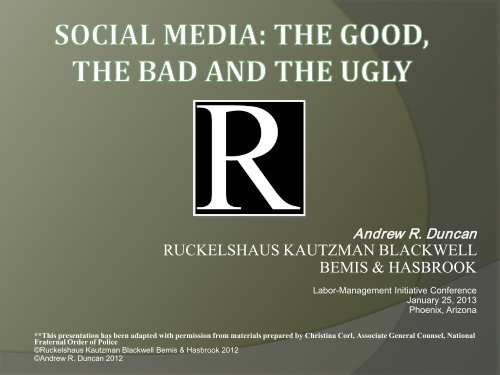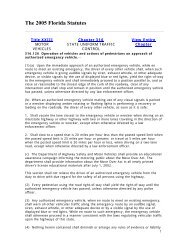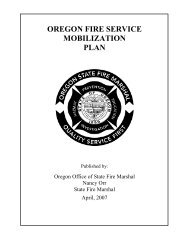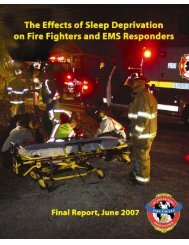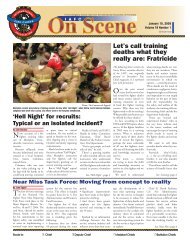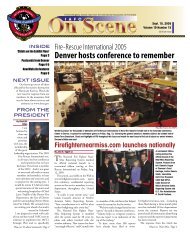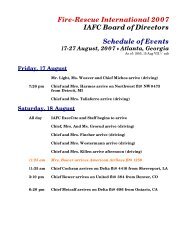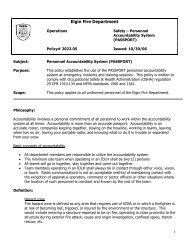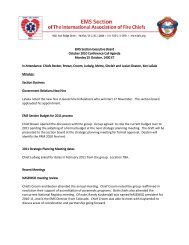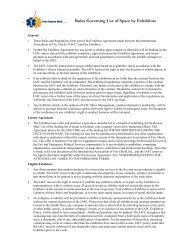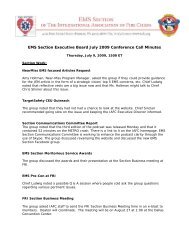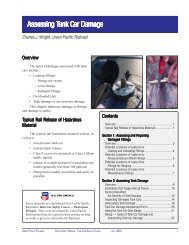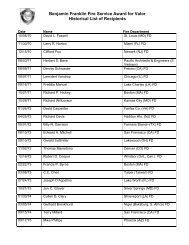Social Media - The Good, The Bad, and The Ugly - International ...
Social Media - The Good, The Bad, and The Ugly - International ...
Social Media - The Good, The Bad, and The Ugly - International ...
You also want an ePaper? Increase the reach of your titles
YUMPU automatically turns print PDFs into web optimized ePapers that Google loves.
Andrew R. Duncan<br />
RUCKELSHAUS KAUTZMAN BLACKWELL<br />
BEMIS & HASBROOK<br />
Labor-Management Initiative Conference<br />
January 25, 2013<br />
Phoenix, Arizona<br />
**This presentation has been adapted with permission from materials prepared by Christina Corl, Associate General Counsel, National<br />
Fraternal Order of Police<br />
©Ruckelshaus Kautzman Blackwell Bemis & Hasbrook 2012<br />
©Andrew R. Duncan 2012
Facebook <strong>and</strong> Twitter<br />
Facebook: “Millions of people use Facebook<br />
everyday to keep up with friends, upload an<br />
unlimited number of photos, share links <strong>and</strong><br />
videos, <strong>and</strong> learn more about the people they<br />
meet.” “Giving people the power to share <strong>and</strong><br />
make the world more open <strong>and</strong> connected.”<br />
www. facebook.com<br />
Twitter: Twitter is a real-time information<br />
network that connects you to the latest information<br />
about what you find interesting. Simply find the<br />
public streams you find most compelling <strong>and</strong><br />
follow the conversations.<br />
www.twitter.com<br />
©Ruckelshaus Kautzman Blackwell Bemis & Hasbrook 2012<br />
©Andrew R. Duncan 2012
Statistics<br />
○ 1 Billion active Facebook users (Oct. 2012)<br />
○ 4,331 Facebook employees<br />
○ On Average, 584 million daily active FB users<br />
(Sept. 2012)<br />
www.facebook.com<br />
○ Twitter has approximately 500 Million<br />
registered profiles<br />
○ Twitter averages 11 new accounts…..per<br />
second<br />
www.mediabistro.com<br />
©Ruckelshaus Kautzman Blackwell Bemis & Hasbrook 2012<br />
©Andrew R. Duncan 2012
©Ruckelshaus Kautzman Blackwell Bemis & Hasbrook 2012<br />
©Andrew R. Duncan 2012
Statistics<br />
<strong>Social</strong> <strong>Media</strong> accounts for approx. 25%<br />
of all time spent online<br />
Facebook accounts for nearly 10% of all<br />
website traffic in the U.S.<br />
○ Source: Experian.com (2012)<br />
©Ruckelshaus Kautzman Blackwell Bemis & Hasbrook 2012<br />
©Andrew R. Duncan 2012
THE POWER OF SOCIAL MEDIA<br />
News of Osama Bin Laden’s killing broke on<br />
Twitter <strong>and</strong> Facebook before it did on ANY major<br />
media news outlet!!!<br />
©Ruckelshaus Kautzman Blackwell Bemis & Hasbrook 2012<br />
©Andrew R. Duncan 2012
©Ruckelshaus Kautzman Blackwell Bemis & Hasbrook 2012<br />
©Andrew R. Duncan 2012
Statistics that should SCARE<br />
Employees<br />
By 2015, 60% of employers will monitor social<br />
media pages.<br />
www.findlaw.com<br />
44% of employers use social networking sites to<br />
research job c<strong>and</strong>idates<br />
• “Use of drugs or drinking <strong>and</strong> posting of photographs<br />
deemed ‘inappropriate’ or ‘provocative’ were identified as<br />
the most popular reasons why employers eliminated a<br />
c<strong>and</strong>idate after viewing their social networking profile.”<br />
www.pcworld.com<br />
39% of employers have looked up profiles of<br />
current employees on social networking sites<br />
It should be no surprise that management<br />
researches employees’ online profiles<br />
©Ruckelshaus Kautzman Blackwell Bemis & Hasbrook 2012<br />
©Andrew R. Duncan 2012
Monitoring Software<br />
<strong>Social</strong> Sentry: Software sold to<br />
employers that will automatically monitor<br />
employees’ social networking accounts<br />
Spytech<br />
SpectorPro<br />
SniperSpy<br />
XPCSpyPro<br />
ActivTrak – FREE!!!<br />
©Ruckelshaus Kautzman Blackwell Bemis & Hasbrook 2012<br />
©Andrew R. Duncan 2012
So you get fired because of a Facebook<br />
post…what to do?<br />
Post about it on ……….Facebook, of course<br />
“Fired by Facebook” is a Facebook page<br />
where those who have been fired because of<br />
postings made on Facebook can tell their<br />
stories!!!<br />
©Ruckelshaus Kautzman Blackwell Bemis & Hasbrook 2012<br />
©Andrew R. Duncan 2012
Always Be Cautious!!!!<br />
Potential future employers will<br />
screen your page during the<br />
hiring process, find out what<br />
happened with former employers,<br />
<strong>and</strong> know that you badmouth<br />
prior employers!!!<br />
©Ruckelshaus Kautzman Blackwell Bemis & Hasbrook 2012<br />
©Andrew R. Duncan 2012
A Full Facebook Profile<br />
<br />
<br />
<br />
<br />
<br />
<br />
<br />
<br />
<br />
<br />
<br />
<br />
<br />
<br />
Educational History<br />
Employment History<br />
Marital Status*<br />
Religious views*<br />
Political views*<br />
Family members<br />
Birthday<br />
Current Location<br />
Likes/Dislikes<br />
Online <strong>and</strong> offline contact information/residence<br />
Uploaded photos <strong>and</strong> videos<br />
Wall posts<br />
Status updates<br />
“Friends” lists<br />
Email <strong>and</strong> real-time communication<br />
<br />
* Employers cannot ask for this information or consider in employment decisions<br />
©Ruckelshaus Kautzman Blackwell Bemis & Hasbrook 2012<br />
©Andrew R. Duncan 2012
Employees - Don’t<br />
Beat Yourself!<br />
Typically, an interviewer/potential employer<br />
can’t ask about: religion, marital status,<br />
sexual orientation, age, political<br />
affiliation/views, union membership, etc.<br />
BUT….if the info is on your Facebook page<br />
or you put it on Twitter they don’t have to<br />
ask <strong>and</strong> can make hiring decisions based<br />
upon impermissible criteria!<br />
©Ruckelshaus Kautzman Blackwell Bemis & Hasbrook 2012<br />
©Andrew R. Duncan 2012
Regulation <strong>and</strong> Monitoring of Off-Duty<br />
Conduct<br />
Off-duty conduct that in any way<br />
reflects negatively on the<br />
Department & has the potential to<br />
impair Department efficiency can<br />
form the basis of discipline.<br />
• Public Safety Members can never shed their<br />
roles as employees, even off duty, because<br />
“part of their job is to safeguard the public’s<br />
opinion of them” Locurto v. Giuliani, 447 F.3d<br />
159 (2d Circuit 2006).<br />
©Ruckelshaus Kautzman Blackwell Bemis & Hasbrook 2012<br />
©Andrew R. Duncan 2012
<strong>The</strong> Legal Ramifications of <strong>Social</strong><br />
Networking<br />
June 2006: Marion County, FL Sheriff’s deputy<br />
fired for “conduct unbecoming” – posted picture of<br />
self on MySpace in uniform with comments about<br />
women’s breasts, binge drinking <strong>and</strong> nude<br />
swimming<br />
2006: Three (3) Palm Beach Sheriff’s Deputies<br />
<strong>and</strong> their wives engaged in group sex <strong>and</strong> made<br />
videos. Videos sold on Internet. Deputies were<br />
terminated. Termination upheld on appeal.<br />
Thaeter v. Palm Beach County Sheriff’s Office,<br />
449 F.3d 1342 (11 th Cir. 2006)<br />
©Ruckelshaus Kautzman Blackwell Bemis & Hasbrook 2012<br />
©Andrew R. Duncan 2012
<strong>The</strong> Legal Ramifications of <strong>Social</strong><br />
Networking<br />
<br />
<br />
Police officer in New Mexico lists his occupation on<br />
Facebook as “human waste disposal”<br />
○ Result: Placed on desk duty + new department-wide policy implemented to<br />
govern use of social networking<br />
Police officer fired after filming self stripping off police<br />
uniform <strong>and</strong> masturbating. Sold video on eBay.<br />
○ Result: Termination --- Upheld by U.S. Supreme Court , 9-0. San Diego v.<br />
Roe, 543 U.S. 77 (2004).<br />
○<br />
○<br />
“Officer's activities, though outside the workplace <strong>and</strong> purportedly<br />
about subjects not related to his employment, had injurious effect on<br />
mission of his employer <strong>and</strong> were not entitled to First Amendment<br />
protection”.<br />
Government employers CAN restrict their employees’ speech in ways that<br />
would be unconstitutional if applied to general public. *Exception:<br />
speaking as a citizen on matters of public concern.<br />
©Ruckelshaus Kautzman Blackwell Bemis & Hasbrook 2012<br />
©Andrew R. Duncan 2012
<strong>The</strong> Legal Ramifications of <strong>Social</strong><br />
Networking<br />
Even if you think you’re helping, others<br />
may see it differently!<br />
Shannon Hills, AR police officer fired<br />
after posting the following on Facebook:<br />
"If you live in Alex<strong>and</strong>er <strong>and</strong> you're drinking<br />
<strong>and</strong> driving, get yourself a designated driver. If<br />
you don't <strong>and</strong> you're out on the streets, you'll<br />
wish you had. Just a word to the wise."<br />
Chief said post hampered the DUI<br />
checkpoint operation <strong>and</strong> the officer<br />
‘caused the termination on himself’.<br />
©Ruckelshaus Kautzman Blackwell Bemis & Hasbrook 2012<br />
©Andrew R. Duncan 2012
<strong>The</strong> Legal Ramifications of <strong>Social</strong><br />
Networking<br />
Indiana State Police Trooper posted drunken<br />
photos of himself on Facebook with a .357<br />
Magnum pointed at his head by officer from<br />
different agency.<br />
Trooper also posted comment about<br />
homeless man ruffed up by police in<br />
California: “<strong>The</strong>se people should have died<br />
when they were young, anyway, I’m just<br />
doing them a favor”<br />
○ Result: Resignation (trooper)<br />
○ Result: 5 day susp. w/o pay<br />
©Ruckelshaus Kautzman Blackwell Bemis & Hasbrook 2012<br />
©Andrew R. Duncan 2012
©Ruckelshaus Kautzman Blackwell Bemis & Hasbrook 2012<br />
©Andrew R. Duncan 2012
<strong>The</strong> Legal Ramifications of <strong>Social</strong><br />
Networking<br />
2011: Bourne, MA firefighter posted<br />
Facebook comments utilizing foul language<br />
in tirade criticizing work assignment.<br />
○ “Stuck at (expletive) m<strong>and</strong>atory, on top of that<br />
I got to put up with (expletives) who love this<br />
Town <strong>and</strong> are involved in this (expletive)<br />
politically motivated paraid(sic)”<br />
○ Result: Terminated. Basis: “flagrant misconduct,<br />
ridiculed <strong>and</strong> disparaged fellow members of the<br />
department” “Used profane, obscene, indecent, or<br />
disrespectful language that was even offensive to<br />
the gay community.”<br />
©Ruckelshaus Kautzman Blackwell Bemis & Hasbrook 2012<br />
©Andrew R. Duncan 2012
http://www2.turnto10.com/news/2011/feb/25/cape-firefighter-fired-facebook-postings-ar-406513/<br />
©Ruckelshaus Kautzman Blackwell Bemis & Hasbrook 2012<br />
©Andrew R. Duncan 2012
<strong>The</strong> Legal Ramifications of <strong>Social</strong><br />
Networking<br />
Moncks Corner, S.C. – Police officer<br />
relieved of duty after posting photo on<br />
Facebook of women in bikinis on hood of<br />
patrol car participating in fundraiser, “Tits n<br />
Tats”, featuring employees of Diamonds<br />
North Night Club.<br />
©Ruckelshaus Kautzman Blackwell Bemis & Hasbrook 2012<br />
©Andrew R. Duncan 2012
<strong>The</strong> Legal Ramifications of <strong>Social</strong><br />
Networking<br />
Bonus: One of these women is a<br />
Sheriff’s Deputy!<br />
©Ruckelshaus Kautzman Blackwell Bemis & Hasbrook 2012<br />
©Andrew R. Duncan 2012<br />
www.cbsnews.com
But…........<br />
What about my 1 st Amendment<br />
Rights?!?!<br />
I was off duty!!!!!<br />
Don’t I have constitutionally protected<br />
privacy interests?!?!<br />
This is my private life – they can’t do<br />
this to me!!!!<br />
I didn’t say anything that wasn’t true!!!!<br />
©Ruckelshaus Kautzman Blackwell Bemis & Hasbrook 2012<br />
©Andrew R. Duncan 2012
<strong>The</strong> Limitations of Constitutional<br />
<strong>and</strong> Legal Protections<br />
<strong>The</strong>re are two common constitutional protections<br />
often raised by public employees seeking<br />
remedies for discipline based upon social media:<br />
1) 1 st Amendment protected speech <strong>and</strong> 2)<br />
Protected Privacy Interest(s)<br />
In either context the constitutional protections are<br />
substantially balanced between the employees<br />
rights vs. the right of the public employer to<br />
effectively direct <strong>and</strong> maintain its workforce.<br />
When it comes to social media <strong>and</strong> technology<br />
both legislators <strong>and</strong> the courts have been slow<br />
to adopt a clear course of action.<br />
©Ruckelshaus Kautzman Blackwell Bemis & Hasbrook 2012<br />
©Andrew R. Duncan 2012
<strong>The</strong> Limitations of Constitutional<br />
<strong>and</strong> Legal Protections<br />
Courts are generally holding that off-duty conduct<br />
that negatively reflects upon the Department or<br />
has even the potential to disrupt the Department<br />
can form the basis for discipline.<br />
“Police officers <strong>and</strong> firefighters alike are<br />
quintessentially public servants. As such, part of<br />
their job is to safeguard the public's opinion of<br />
them, particularly with regard to a community's<br />
view of the respect that police officers <strong>and</strong><br />
firefighters accord the members of that<br />
community.” Locurto v. Giuliani.<br />
©Ruckelshaus Kautzman Blackwell Bemis & Hasbrook 2012<br />
©Andrew R. Duncan 2012
Existing 1st Amendment<br />
Protections<br />
Garcetti v. Ceballos, 547 U.S. 410 (2006) - district<br />
attorney claimed was passed up for promotions<br />
after voicing concern verbally <strong>and</strong> in writing that a<br />
fraudulent search warrant was being relied upon<br />
by prosecution.<br />
SCOTUS held: “When public employees make<br />
statements pursuant to their official duties, the<br />
employees are not speaking as citizens for 1 st<br />
Amendment purposes, <strong>and</strong> the Constitution does<br />
not insulate their communications from employer<br />
discipline.” 547 U.S. at 421<br />
©Ruckelshaus Kautzman Blackwell Bemis & Hasbrook 2012<br />
©Andrew R. Duncan 2012
<strong>The</strong> 1st Amendment <strong>and</strong><br />
Public Employee Speech<br />
Union Representatives<br />
• Firefighter speaking in capacity as union rep is<br />
protected – union status equates to citizenship.<br />
Davison v. City of Minneapolis, 490 F.3d 648 (8 th Cir.<br />
2007).<br />
• Police Officer making statement in capacity as union<br />
representative speaks as citizen, not employee.<br />
Shefcik v. Vill. of Calumet Park, 532 F.Supp.2d 965<br />
(N.D. Ill. 2007). See also, Nagle v. Vill of Calumet<br />
Park, 554 F.3d 1106 (7 th Cir. 2009) – speech<br />
protected but was held not a matter of public<br />
concern.<br />
©Ruckelshaus Kautzman Blackwell Bemis & Hasbrook 2012<br />
©Andrew R. Duncan 2012
<strong>The</strong> 1st Amendment <strong>and</strong><br />
Public Employee Speech<br />
Love v. Rehfus, 946 N.E.2d 1 (Ind. 2011)<br />
Firefighter terminated for sending a political<br />
email criticizing the fire chief, while off-duty<br />
<strong>and</strong> from his home computer.<br />
Ind. Supreme Court held that the firefighter<br />
was speaking as a citizen on a matter of public<br />
concern plus strong 1 st Amendment character<br />
of the speech outweighed any disruption of<br />
governmental interest.<br />
<strong>The</strong> email was viewed by the Court as 100%<br />
political speech, without parsing the<br />
statements or ideas presented in the email.<br />
©Ruckelshaus Kautzman Blackwell Bemis & Hasbrook 2012<br />
©Andrew R. Duncan 2012
<strong>The</strong> 1st Amendment <strong>and</strong><br />
Public Employee Speech<br />
Often courts will separate parts of online<br />
speech to determine which elements of the<br />
speech are protected <strong>and</strong> which are not.<br />
If the employer relies on both protected <strong>and</strong><br />
unprotected speech for adverse employment<br />
action, courts will often uphold the employer’s<br />
action based on the reliance of the<br />
unprotected speech alone.<br />
This common approach provides greater<br />
deference to the employer employees rarely<br />
succeed when courts take this approach.<br />
©Ruckelshaus Kautzman Blackwell Bemis & Hasbrook 2012<br />
©Andrew R. Duncan 2012
<strong>The</strong> 1st Amendment <strong>and</strong><br />
Public Employee Speech<br />
Monz v. Rocky Point Fire Dist., 853 F.Supp.2d<br />
277 (E.D. N.Y. 2012)<br />
Volunteer firefighter engaged in public lobbying<br />
for stricter alcohol regulations <strong>and</strong> made internal<br />
complaints about other firefighter’s defacing of<br />
political posters. Management refused to<br />
reinstate the firefighter after he went on<br />
voluntary leave.<br />
District court held that the lobbying was<br />
protected speech, but that the internal<br />
complaints were not. <strong>The</strong> presence of the<br />
unprotected speech justified the refusal to<br />
reinstate.<br />
©Ruckelshaus Kautzman Blackwell Bemis & Hasbrook 2012<br />
©Andrew R. Duncan 2012
<strong>The</strong> 1st Amendment <strong>and</strong><br />
Public Employee Speech<br />
Curran v. Cousins, 509 F.3d 36 (1 st Cir. 2007)<br />
Corrections officer was terminated after making<br />
comments on union website comparing the<br />
Sheriff to Hitler, those following the Sheriff’s<br />
instructions to Hitler’s generals, officers to the<br />
Jews being marched to death chambers, <strong>and</strong><br />
further, referencing the plot to assassinate Hitler<br />
in regard to the Sheriff.<br />
Court of Appeals held that non-threatening<br />
elements of the post were protected political<br />
speech, but that the threatening elements were<br />
not protected. <strong>The</strong> unprotected speech with<br />
prior bad conduct was sufficient to justify<br />
termination.<br />
©Ruckelshaus Kautzman Blackwell Bemis & Hasbrook 2012<br />
©Andrew R. Duncan 2012
<strong>Social</strong> <strong>Media</strong> <strong>and</strong> the<br />
Constitutional Right to Privacy<br />
Supreme Court has recognized the potential for<br />
protected privacy interests in even text messages<br />
sent on employer owned devices. City of Ontario,<br />
Cal. V. Quon, 130 S.Ct. 2619 (U.S. 2010).<br />
SCOTUS declined to recognize a protected<br />
property interest in electronic messages due to the<br />
evolving nature of technology<br />
Importantly, SCOTUS found that even if a<br />
protected privacy interest exists, that public<br />
employers are entitled to access such information<br />
for reasonable work-related purposes.<br />
©Ruckelshaus Kautzman Blackwell Bemis & Hasbrook 2012<br />
©Andrew R. Duncan 2012
<strong>Social</strong> <strong>Media</strong> <strong>and</strong> the<br />
Constitutional Right to Privacy<br />
<strong>The</strong>re is much ground to be covered regarding<br />
social media <strong>and</strong> privacy rights<br />
SCOTUS’ holding in City of Ontario leaves the<br />
door open to evolving protections of public<br />
employees’ <strong>and</strong> general citizens’ privacy rights<br />
This open ended question can be problematic<br />
for both employers <strong>and</strong> employees.<br />
©Ruckelshaus Kautzman Blackwell Bemis & Hasbrook 2012<br />
©Andrew R. Duncan 2012
Adopting Effective <strong>and</strong> Legal<br />
<strong>Social</strong> <strong>Media</strong> Policies<br />
A good social media policy can safely<br />
establish boundaries <strong>and</strong> save municipalities<br />
<strong>and</strong> fire departments a fortune in legal fees.<br />
<strong>The</strong> best social media policies are clear,<br />
concise, <strong>and</strong> are narrowly tailored.<br />
Policies must strike a definitive balance<br />
between employer <strong>and</strong> employee rights.<br />
Forbes suggests restricting media policies to<br />
cover four basic criteria “Don’t Lie, Don’t<br />
Cheat, Don’t Steal, <strong>and</strong> Don’t Reveal”<br />
©Ruckelshaus Kautzman Blackwell Bemis & Hasbrook 2012<br />
©Andrew R. Duncan 2012
Adopting Effective <strong>and</strong> Legal<br />
<strong>Social</strong> <strong>Media</strong> Policies<br />
When in doubt employers should be cautious.<br />
Overly inclusive, unclear, or overly broad<br />
policies are ripe for attack in litigation.<br />
Illegal or unconstitutional social media policies<br />
will invite litigation at great expense to both<br />
labor <strong>and</strong> management.<br />
<strong>The</strong> NLRB has established model social media<br />
policies. Note: NLRB not applicable to public<br />
employees<br />
©Ruckelshaus Kautzman Blackwell Bemis & Hasbrook 2012<br />
©Andrew R. Duncan 2012
Adopting Effective <strong>and</strong> Legal<br />
<strong>Social</strong> <strong>Media</strong> Policies<br />
Baltimore firefighters terminated after they<br />
joked anonymously in internet forums about<br />
refusing to respond to runs at a restaurant that<br />
refused to provide a firefighter discount.<br />
<strong>The</strong> fire chief responded by instituting an<br />
expansive social media policy that included:<br />
<br />
<br />
<br />
A bar from commenting on matters of public concern<br />
while on duty<br />
Possible discipline for anything written online that is<br />
deemed to violate conduct rules, irrespective of off duty<br />
status or anonymity<br />
Fire units can no longer maintain individual unit websites<br />
©Ruckelshaus Kautzman Blackwell Bemis & Hasbrook 2012<br />
©Andrew R. Duncan 2012
Adopting Effective <strong>and</strong> Legal<br />
<strong>Social</strong> <strong>Media</strong> Policies<br />
Philadelphia adopted a very broad policy<br />
denying both on <strong>and</strong> off duty firefighters the<br />
ability to:<br />
<br />
<br />
<br />
Identify themselves as members of the fire department<br />
without express permission from the Commissioner.<br />
Post any information or pictures which “may bring the<br />
member’s or the department’s reputation into question”.<br />
Post racist or sexist comments, inaccurate information,<br />
personal attacks, or rumors.<br />
Both the Baltimore <strong>and</strong> Philadelphia policies<br />
pose restrictions that may be unconstitutional.<br />
©Ruckelshaus Kautzman Blackwell Bemis & Hasbrook 2012<br />
©Andrew R. Duncan 2012
Employers Requesting <strong>Social</strong><br />
<strong>Media</strong> Passwords<br />
Employers are now requesting social media or<br />
personal email passwords of prospective<br />
employees as a condition of employment.<br />
In early 2012, U.S. senators requested that the<br />
Attorney General begin investigating the<br />
legality of such practices.<br />
<strong>The</strong>re are currently no cases or legislation<br />
specifically addressing this coercive, but<br />
voluntary provision of personal information to<br />
prospective employers.<br />
©Ruckelshaus Kautzman Blackwell Bemis & Hasbrook 2012<br />
©Andrew R. Duncan 2012
Employers Requesting <strong>Social</strong><br />
<strong>Media</strong> Passwords<br />
Current constitutional privacy law <strong>and</strong> other<br />
federal laws may apply to such requests.<br />
<strong>The</strong> emerging privacy interest recognized in<br />
City of Ontario may pave the way for<br />
prohibiting such employer conduct as a<br />
violation of constitutionally protected privacy<br />
interests.<br />
©Ruckelshaus Kautzman Blackwell Bemis & Hasbrook 2012<br />
©Andrew R. Duncan 2012
<strong>Social</strong> Networking TIPS<br />
(Employees)<br />
Don’t be on Facebook, Twitter, MySpace,<br />
etc.<br />
But if you must…….<br />
• Activate all privacy settings<br />
• “Friend” only those people you know <strong>and</strong> trust<br />
• Avoid posting pictures<br />
• Monitor your page<br />
• Don’t post anything you wouldn’t want your mother<br />
to see<br />
• Complain about employment problems to your Union<br />
President!!<br />
• Don’t use social networking sites after drinking!<br />
• USE YOUR BRAIN!!!!<br />
©Ruckelshaus Kautzman Blackwell Bemis & Hasbrook 2012<br />
©Andrew R. Duncan 2012
<strong>Social</strong> Networking TIPS<br />
(Employers)<br />
Adopt clear, concise, <strong>and</strong> narrowly tailored social<br />
media policies.<br />
When adopting social media policies, rely on well<br />
drafted or legally tested policies or preferably seek<br />
competent legal counsel.<br />
Impose social media policies in an equitable fashion;<br />
disparate treatment of similarly situated employees is<br />
not permissible.<br />
Avoid over reaching or surveilling off duty employee<br />
conduct that is not work related. Reliance on this<br />
type of speech is likely to expose both you <strong>and</strong> your<br />
department to liability.<br />
Don’t request prospective or current employee social<br />
media or private email passwords.<br />
©Ruckelshaus Kautzman Blackwell Bemis & Hasbrook 2012<br />
©Andrew R. Duncan 2012
Employees<br />
REMEMBER………<br />
You are responsible for your<br />
online activity! Once you post<br />
something on the Internet or<br />
otherwise transmit information<br />
electronically it is effectively<br />
there FOREVER!<br />
©Ruckelshaus Kautzman Blackwell Bemis & Hasbrook 2012<br />
©Andrew R. Duncan 2012
Employers<br />
REMEMBER………<br />
Implement clear, concise, reasonable<br />
<strong>and</strong> fair policies<br />
Don’t overreact when an employee uses<br />
social media to express an opinion …<br />
take a step back to process the<br />
information. But act decisively if the<br />
circumstances call for it.<br />
©Ruckelshaus Kautzman Blackwell Bemis & Hasbrook 2012<br />
©Andrew R. Duncan 2012
Thank You<br />
Andrew R. Duncan<br />
ard@rucklaw.com<br />
RUCKELSHAUS KAUTZMAN BLACKWELL<br />
BEMIS & HASBROOK<br />
www.rucklaw.com<br />
©Ruckelshaus Kautzman Blackwell Bemis & Hasbrook 2012<br />
©Andrew R. Duncan 2012


